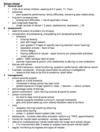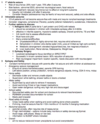Long case issues Flashcards

Aboriginal health

ADHD

AED interaction

AED
side effects

Ashworth scale

Aspiration

Attachment

Behavioural management

Body image

Bone issues

Bullying

Carer support

Cerebral Palsy

CF management

CHD complications

Chronic illness

Communication

Complementary medications

Compliance

Compliance issues in adolescence
- Establish agreed agenda for consultation
- Establish main difficulties: show respect and empathy
- Say positive thing
- Outline problem: don’t assume patient knowns everything they need to about their condition
- Outline health issues if no change: be honest
- Action plan before next clinic: define roles in management of condition for patient and parents, short term goals
- Extra support: ask they how they would like help
Consider psychological co-morbidities
Think how an MDT might help
Complications CF

Confidentiality

Consent

Constipation

Delayed puberty

Developmental delay

Developmental Delay

Drooling

Drugs affecting bone health

Early intervention

Emergency care plan

End of life care
Early involvement of palliative care

Failure to thrive
Definition: dropped> 2 centiles
Management
- growth curve: monitor growth and growth velocity
- family history
- dietary diary
- in/out balance
- exclude pathological causes: FBC, EUC, LFTs, TFTs, micronutrients, coeliac screen, CF, stool tests, urine culture, metabolic test, endoscopy
- depend on severity: admission for dietary diary
Differential
Decreased intake
- fussy eating/oral aversion/behavioural issues (sensory)
Increased expendicture/output
- diarrhoea, chronic disease
Decreased absorption
- coeliac, IBD

Financial support

Fussy eating

Genetic counselling

HEADSS

Hearing loss

Hospitalisation

Hospitalisation

Immunisation

Immunosuppresants

Immunosuppression

Menstruation in the disabled

NDIS

Needle phobia

Nocturnal enuresis

Nutrition

Obesity

Oral aversion
Education:
- inform parents long term
Management
- introduce foods as early as possible
- family mealtimes
- fun and encourage to explore texture food
- graded exposure
- no force feeds
- reduce iatrogenic equipment
- dental health
- monitor nutrition
Support
- SP, dietician, feeding clinic

Orthopaedic issues CP

OSA

Pain

Pain in disabled

Parenteral nutrition

Prematurity
acute

Prematurity
chronic

Refeeding

Relationship boundaries

Relationship boundaries

Respite services

Resuscitation status

Rural issues

School for special needs

School refusal

Screening CP

Seizures

Sibling issues

Sleep initiation

Smoking

Social burden

Social burden

Spasticity

Spasticity

Steroid side effects

Stoma care

Substance abuse

Tracheostomy

Tracheostomy
indications

Tracheostomy

Transition of care
Trapeze/transition support service:
- compliance issues
- unplanned admissions
- indigenous
- cultural
- complex background coordination
- 14-25 years
MDT meeting
- discuss management

UTIs

Weight in CP

Withdrawal of AED

Financial support



